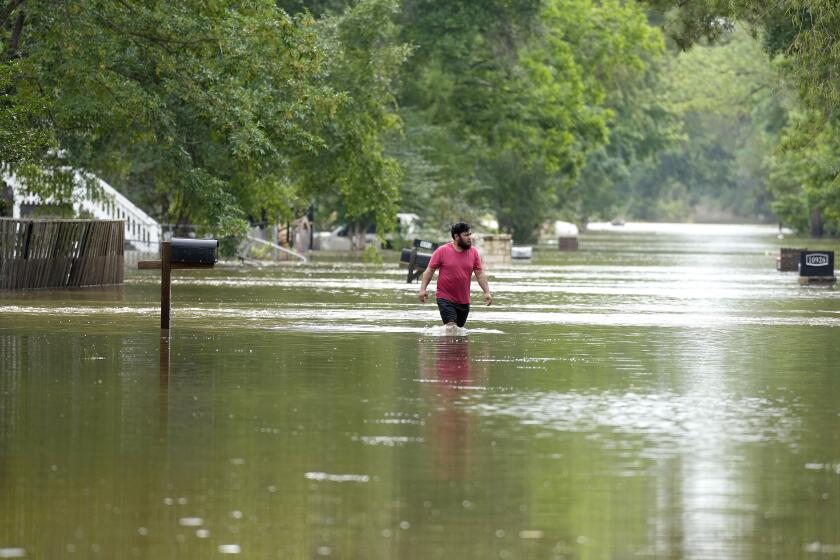Pirates Ride High on Mexico Highways
Nestor Castellanos eased his 18-wheeler onto the freeway, carefully checking the rearview mirror. Tailing him was a black minivan with two pistol-packing guards. In the seat behind Castellanos perched a former riot police officer, tear gas at the ready.
“We’ve got dangerous cargo,” warned the driver.
Castellanos was beginning one of the most perilous journeys in late 20th century Mexico: carrying bolts of fabric to a ladies’ clothing factory in the capital, about 200 miles northwest of this port.
In another sign of the collapse of order in Mexico, brigands are terrorizing the highways in a way not seen since the days of the 1910-17 revolution. Assaults on trucks have soared from a few hundred to perhaps 40,000 a year. Businesses are losing millions of dollars; some now send armed guards to escort truckers like Castellanos, much as Wells Fargo did with its stagecoaches in the Old West.
“There are no authorities. There’s a void. [The highways] have become no man’s land,” said Luis Angel Carvallo, head of the truckers association in Veracruz.
The resurgent piracy reflects one of this country’s greatest and most baffling problems--an explosion in crime.
Initially, authorities blamed the high crime rate on the 1995 economic crisis, which sent prices and unemployment skyrocketing. But officials now find that they are confronting something much more sophisticated: criminal empires that include everyone from corrupt police to street merchants. Some legitimate businesspeople are even getting involved.
“There’s been a total crack in society,” said Carlos Monsivais, a social critic. “Organized crime has become an alternative state.”
The highway banditry problem emerged seemingly out of nowhere. Castellanos, 38, said his colleagues suddenly started being attacked four or five years ago. One wound up in a wheelchair after bandits opened fire on his cab. Recently, Castellanos’ 18-year-old son was briefly kidnapped by pirates who hijacked the truck in which he was riding.
“You don’t know where they’ll strike,” said Castellanos, easing his rig through rolling, palm-dotted hills, his eyes flitting to the mirror to check on the security van trailing him.
“Some colleagues have been robbed in urban areas. Some at tollbooths,” he said. “This has grown too fast.”
In fact, Alberto Villagran, damage analyst for the Mexican Insurance Assn., said reported truck robberies shot from 350 in 1993 to nearly 11,000 three years later--and the figures don’t include uninsured vehicles, which constitute the majority of trucks on the road.
“People began to steal canned goods. We thought it was because they didn’t have money to buy the products,” Villagran said. “But with time, we realized: No. It extended to all sorts of products, even raw materials. These are made-to-order robberies.”
Authorities blame the underground economy. Traditionally, the government had turned a blind eye to the informal street markets that absorbed hundreds of thousands of unemployed Mexicans. Authorities even helped the vendors in exchange for political support.
Now, authorities are realizing, many street merchants have grown into commercial Frankensteins. If they need bluejeans, color TVs or detergent, they simply turn to a gang of pirates to steal the goods for them.
“The gangs know the factories, the roads, how to do it. They have access and no fear. They have heavy weaponry and stolen cars,” said Leon Halkin, vice president of the Mexican industrialists association.
Gangs Find Profits in Truck Robbery
Trucks aren’t the only targets of the modern-day pirates. In the first six months of this year, nearly 300 buses were assaulted on federal highways, according to the Interior Ministry.
But authorities claim to have sharply reduced raids against such passenger vehicles, crimes they say are generally committed by amateurs. In contrast, truck robbery has become so organized and lucrative that authorities are comparing it to narcotics trafficking.
“We’re not talking about five or 10 people who decide in the morning to commit a robbery,” said Arturo Salinas, head of highway safety at the ministry. “We’re talking about well-organized groups with impressive wealth. We’re talking about gangs with cars, radio communication, with enough money to buy off truck drivers, warehouse owners and traffic managers inside businesses.”
Consuelo Munoz, a Mexico City prosecutor who handles truck assaults, said she began to realize the scope of the problem in February. Her investigators, acting on a tip, went to check out a warehouse in Jiutepec, about 50 miles south of the capital. Inside they discovered a criminal emporium: 250 tons of Yamaha motorcycles, crystal, Tupperware, bolts of fabric and other goods.
“All of it had been reported stolen,” Munoz said.
But the gangs’ sophistication goes beyond having their own warehouses. Investigators have discovered that some pirates specialize, focusing on stealing toilet paper, sugar or tires. Others pay customs workers to tip them off when shipments are leaving ports or crossing borders.
Some robbers even reject cargo they don’t need. Last year, for example, a band of thieves stopped, then freed, the driver of a truck carrying Nivea face cream, said Cmdr. Fructuoso Gamez, the top investigator for vehicle-robbery operations at the Mexico City prosecutor’s office.
“They said, ‘No, you’re not the one we’re looking for,’ ” said Gamez, explaining that the bandits had expected to find premium cosmetics. Authorities later discovered that the gang had a relative employed at the company who was revealing the trucks’ contents, Gamez said.
The reemergence of piracy isn’t due only to street merchants. The rise of the illegal economy has coincided with another key phenomenon of social breakdown--the shift of Mexican police into organized crime.
Working police and ex-cops fired in anti-corruption purges have been key participants in the drug-trafficking, kidnapping and highway-robbery gangs that have boomed in recent years, say Mexican and U.S. authorities. As the iron-fisted political system has given way to democracy, the government has lost control over its own security forces, critics say.
“As the destruction of the old way occurs, other unwritten rules disappear with it,” said Pete Palmer, head of Problem Solvers, a Mexican security firm that has handled piracy cases.
In the past, police authorities controlled their subordinates through “unwritten rules” allowing the officers to participate in a limited number of crimes in certain areas. Subordinates who got out of line could be killed.
Such control no longer exists. Meanwhile, the justice system has nearly collapsed under the weight of too many cases and too few trained investigators. The resulting impunity makes crime that much more attractive.
Businesses, Drivers Sometimes Involved
Perhaps the most startling development in the piracy boom is the involvement of legitimate businesses and employees.
Authorities estimate, for example, that 30% or more of truck hijackings involve the vehicle drivers themselves, who allow a prearranged “robbery” in exchange for a payoff.
Some drivers “even have the telephones of representatives of the gangs in different areas. They call them, inform them what kind of merchandise they’re carrying, and set a price,” said Miguel Quintanilla, head of the national Mexican truckers association.
Some bigger businesses are involved too. Mexico City police investigators have discovered wholesalers who buy stolen goods and mix them with legitimate groceries. There are hijackings of products that could be useful only to industrial clients--things such as chemicals, newsprint, cheese curd.
“People realized it was easier to earn money through crime,” said Arturo Gutierrez, coordinator of stolen-vehicle investigations at the Mexico City prosecutor’s office.
The hijackings have exacted a heavy financial toll on companies.
Halkin, of the industrialists association, estimates that Mexico is losing $500 million a year in potential foreign and domestic investment because of the transportation risk. Grocery, clothing and other companies have had to raise prices 5% to 10% to compensate for their losses and extra security expenses, he said.
Insurance payouts for cargo robberies jumped 50% in a year, totaling about $100 million in the 12-month period ended June 1996, according to the insurance association. Companies subsequently slashed the number of policies they issued for truck cargo, from 350,000 in 1996 to 60,000 currently, said Villagran, the damage analyst.
So many U.S. multinationals have suffered assaults that U.S. Ambassador Jeffrey Davidow has complained to the Mexican government. Palmer, the security expert, said some American companies are losing a truckload a day to thieves.
“It’s a financial hemorrhage,” he said.
Mexican authorities are now trying to crack down on the pirates. Six central states and Mexico City have set up a joint program to share information and stop trucks that appear to have been robbed. Tellingly, the program is called Serpico--after a New York police officer who battled corruption in law enforcement ranks.
The federal government has boosted the budget for security and is investing in a reorganized, better trained highway police force.
Authorities say such efforts are producing results. The Mexico City prosecutor’s office reports that robberies in the sprawling capital, the final destination of many trucks, dropped from 28,589 in 1996 to 19,417 in 1998. Salinas, of the Interior Ministry, said assaults on national highways dropped from 427 in the first half of 1998 to 267 in the first half of this year. But security and insurance officials say those figures represent only a fraction of the total, since victims report the heists to different offices or sometimes not at all.
Palmer, the security expert, estimated that the number of truck robberies nationwide has surged to 40,000 a year, ranging from hijackings of tractor-trailers to robberies of goods from delivery trucks.
Villagran believes that the number of robberies continues to rise. “The authorities haven’t done their job,” he said.
Armed Guards Needed but Costly
For Castellanos and other truck drivers, piracy has transformed their work from a secure occupation into a life-threatening one. Truckers groups have appealed in vain to the government to call out the military to patrol the highways, or to let the drivers carry guns. But their only defense is caution.
Occasionally, Castellanos has the luxury of traveling with armed guards on the freeway, as he did on this recent trip from Veracruz to Mexico City.
But providing the guards can double the cost of transportation for the clients. Like most Mexican truckers, Castellanos generally travels alone at night on poorly lighted local roads, since his company can’t afford to pay the expensive freeway tolls and remain competitive.
When he arrives safely at his destination, he breathes a sigh of relief.
“I commend myself to God. I go always with him,” Castellanos said. “What else can we do? We have to go on working.”
More to Read
Start your day right
Sign up for Essential California for news, features and recommendations from the L.A. Times and beyond in your inbox six days a week.
You may occasionally receive promotional content from the Los Angeles Times.






